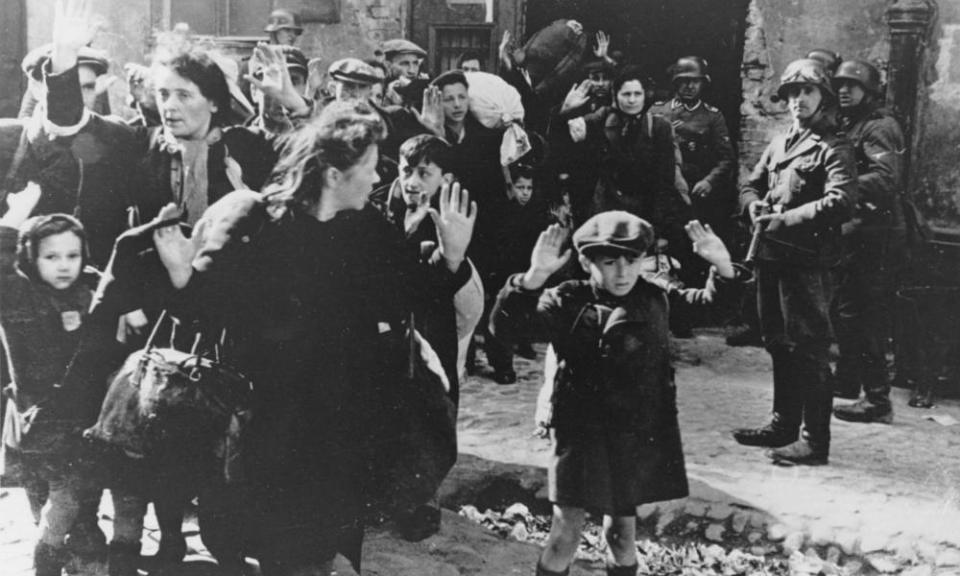Eastern Europe failing on Jewish restitution pledges, study finds

Eastern European countries, in particular Poland, have failed to live up to their pledges to ensure the return of property taken from Jewish people during the second world war, a study has found.
Eight years ago, governments from 46 states promised in the so-called Terezin declaration to try to bring some justice to the victims of the mass thefts of the 1930s and 1940s, in recognition of the advancing age of Holocaust survivors.
But a report to be published on Thursday at a conference hosted by the European Shoah Legacy Institute (ESLI) will accuse Poland of being the most egregious example of a failure to live up to the declarations. Poland had the largest Jewish population in prewar Europe, of whom 90% did not survive beyond 1945.
“Among eastern European countries, Bosnia-Herzegovina and Poland stand alone as the only countries that have failed to establish a comprehensive private property restitution regime for property taken either during the Holocaust or communist eras, or one that addresses both types of takings,” the report says.
“Poland is the only member of the European Union (and a former eastern European member of the communist bloc) not to have passed comprehensive private property restitution legislation in the post-communist era.”
Services are being held around the world on Monday for Holocaust Remembrance Day.
About 500,000 Holocaust survivors are alive today. Up to half are estimated to live in poverty.
Researched by academics over a three-year period, and sponsored by the ESLI, the report found that restitution processes were largely adopted by western states immediately after the war, although unevenly. The latest efforts, in response to the push for more action in 2009, have focused on making the processes for claimants easier.
In the east of Europe, however, efforts in the immediate postwar period were delayed or thwarted by the communist regimes of those countries.
“The outcome was that whatever property had been restituted was subject to a second round of confiscations, this time by communist authorities,” the report says.
After emerging as democracies in the 1990s, some of the new governments of central and eastern Europe passed restitution legislation that covered property confiscated during the Holocaust and the communist era, but eligibility was often limited by states to its own citizens.
The only recourse in Poland has been longstanding provisions in Polish law, rather than any specific legislation designed to help Jewish communities. If property was taken from people in a context that was legal at the time, the authorities today are powerless to help.
Asked last year during a trip to Israel about the gap in Polish law, Poland’s foreign minister, Witold Waszczykowski, said: “Property restitution has been under way in Poland for well over two decades now.
“Property restitution is a process in which claimants’ ethnic or religious background is irrelevant: the Polish law treats everyone in the same manner.
“As far as private property is concerned, the existing legal system in Poland makes it perfectly clear that any legal or natural person (or their heir) is entitled to recover prewar property unlawfully seized by either the Nazi German or the Soviet occupation authorities, or by the postwar communist regime.”
Polish-born Ben Helfgott, 87, who survived the Buchenwald concentration camp before being relocated along with 700 other children to Britain, a country he was to represent at the 1956 Olympics, said countries had a moral duty to the survivors and the dead to recognise the plight of the Jewish people at the time.
“Committing to a substantial, broad and coordinated programme of restitution goes some way to recognising the suffering, anguish and torment that occurred directly to those Jews present at the time, and the damage it caused for generations afterwards.
“There is a moral obligation to the survivors and the dead, to memory and identity, the link of families to their roots and repairing a historic injustice.”
The report’s authors call for Poland, and others, to live up to the Terezin declaration, which was designed to offer over justice to millions of families.
“The substantial amount of immovable property confiscated from European Jews remains unrestituted,” they write.
“The study found that many of the former communist states of eastern Europe have made significant efforts to comply with the Terezin declaration and the guidelines and best practices regarding restitution of Holocaust-era immovable property.
“The remaining work in these countries is to fill gaps in their laws toward meeting the standards of the Terezin declaration.
“However, there are also many other former communist states of eastern Europe that have not yet fulfilled their Terezin obligations to enact immovable property legislation covering Holocaust-era property.”
They add: “Ordinary laws apply to ordinary events. But the Holocaust was an extraordinary event, and it makes little sense to apply ordinary laws to a situation in which so much heirless property suddenly came into existence as a result of the mass murder of millions of people.”

 Yahoo Sport
Yahoo Sport 





































